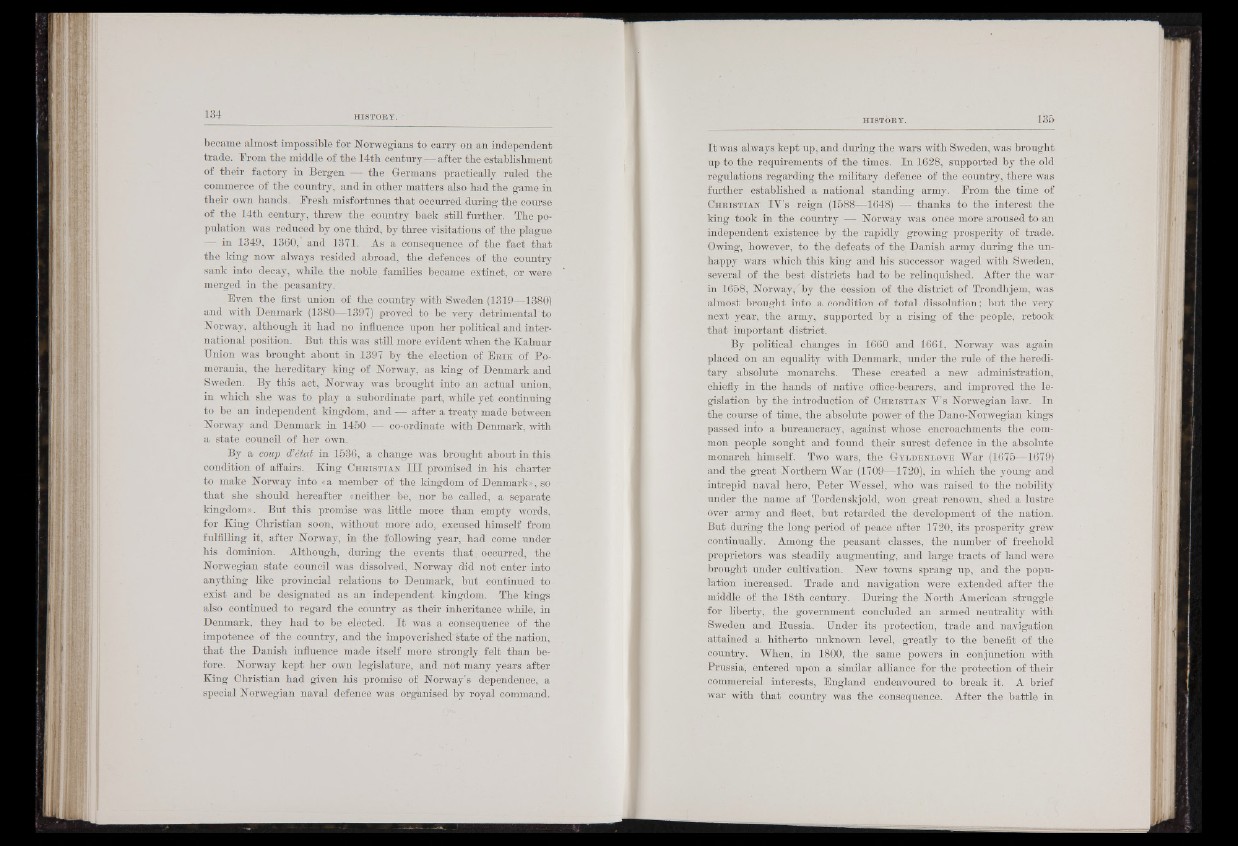
became almost impossible for Norwegians to carry on an independent
trade. From the middle of the 14tb century— after tte establishment
of their factory in Bergen — the Germans practically ruled the
commerce of the country, and in other matters also had the game in
their own hands. Fresh misfortunes that occurred during the course
of the 14th century, threw the country back still further. The population
was reduced by one third, by three visitations of the plague
— in 1349, 1360, and 1371. As a consequence of the fact that
the king now always resided abroad, the defences of the country
sank into decay, whila the noble, families became extinct, or were
merged in the peasantry.
Even the first union of the country with Sweden (1319—1380)
and with Denmark (1380—1397) proved to be very detrimental to
Norway, although it had no influence upon her political and international
position. But this was still more evident when the Kalmar
Union was brought about in 1397 by the election of E r i k of Pomerania,
the hereditary king of Norway, as king of Denmark and
Sweden. By this act, Norway was brought into an actual union,
in which she was to play a subordinate part, while yet continuing
to be an independent kingdom, and — after a treaty made between
Norway and Denmark in 1450 — co-ordinate with Denmark, with
a state council of her own.
By a coup d’état in 1536, a change was brought about in this
condition of affairs. King C h r i s t ia n I I I promised in his charter
to make Norway into .«a member of the kingdom of Denmark», so
that she should hereafter «neither be, nor be called, a separate
kingdom». But this promise was little more than empty words,
for King Christian soon, without more' ado, excused himself from
fulfilling it, after Norway, in the following year, had come under
his dominion. Although, during the events that occurred, the
Norwegian state council was dissolved, Norway did not enter into
anything like provincial relations to Denmark, but continued to
exist and be designated as an independent kingdom. The kings
also continued to regard the country as their inheritance while, in
Denmark, they had to be elècted. It was a consequence of the
impotence of the country, and the impoverished'ktate of the nation,
that the Danish influence made itself more strongly felt than before.
Norway kept her own legislature, and not many years after
King Christian had given his promise of Norway’s dependence, a
special Norwegian naval defence was organised by royal command.
It was always kept up, and during the wars with Sweden, was brought
up to the requirements of the times. In 1628, supported by the old
regulations regarding the military defence of the country, there was
further established a national standing army. From the time of
C h r i s t i a n I Y ’s reign (1588- ^ 1648) ^ m thanks to the interest the
king took in the country — Norway was once more aroused to an
independent existence by the rapidly growing prosperity of trade.
Owing, however, to the defeats of the Danish army during the unhappy
wars which this king and his successor waged with Sweden,
several of the. best districts had to be relinquished. After the war
in 1658, Norway,'by the cession of the district of Trondhjem, was
almost brought into a. condition of total dissolution; but the very
next year, the army, supported by a rising of the' people, retook
that important district.
By political changes in 1660 and 1661, Norway was again
placed on an equality with Denmark, under the rule of the hereditary
absolute monarchs. These created a new administration,
chiefly in the hands of native office-bearers, and improved the legislation
by the introduction of C h r i s t i a n Y’s Norwegian law.. In
the course of time,, the absolute power of the Dano-Norwegian kings
passed into a bnreaucracy, against whose encroachments the common
people sought and found their surest defence in the absolute
monarch himself. Two wars, the G y l d e n l o v b War (1675—1679)
and the great Northern War (1709—1720), in which the young and
intrepid naval hero, Peter Wessel, who was raised to the nobility
under the name af Tordenskjold, won great renown, shed a lustre
over army and fleet, but retarded the development of the nation.
But during the long period of peace after 1720, its prosperity grew
continually. Among the peasant classes, the number of freehold
proprietors was steadily augmenting, and large tracts of land were
brought under cultivation. New towns sprang up, and the population
increased. Trade and navigation were extended after the
middle of the 18th century. During the North American struggle
for liberty, the government concluded an armed neutrality with
Sweden and Russia. Under its protection, trade and navigation
attained a hitherto unknown level, greatly to the benefit of the
country. When, in 1800, the same powers in conjunction with
Prussia', entered upon a similar alliance for the protection of their
commercial interests, England endeavoured to break it. A brief
war with that country was the consequence. After the battle in